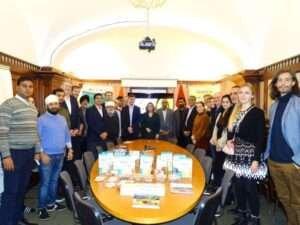Millets: Nourishing the Future in the Fight Against Climate Change

The United Nations Sustainable Development Goal 2, Zero Hunger, aims to achieve universal access to nutritious and sufficient food while eliminating all forms of malnutrition by 2030. As climate change continues to pose threats to food security, it becomes increasingly important to explore resilient crops that can adapt to changing environmental conditions. Millets, a diverse group of highly nutritious grains, hold immense potential in addressing both climate change and food insecurity challenges.
Climate change-induced extreme weather events are wreaking havoc on global food security. For instance, in northern India, heavy monsoon rains led to devastating floods and landslides, resulting in the loss of lives and significant damage to agricultural infrastructure. The region experienced record-breaking rainfall, with New Delhi witnessing the highest precipitation in a single day in July in 40 years. Similarly, the western Mediterranean region grapples with severe drought conditions, which have dire consequences for soil moisture, agricultural productivity, and overall food security. With persistently low rainfall and soaring temperatures, this area is experiencing water scarcity that hampers crop growth and stunts plant development. These events, from floods to droughts, underscore the immediate and varied impacts of climate change on food security, emphasizing the pressing need for effective adaptation measures.
It is obvious that climate change poses significant risks to global food security. These erratic rainfall patterns, prolonged droughts, and rising temperatures disrupt agricultural productivity, leading to reduced crop yields and compromised nutritional content. Some staple crops, such as rice, wheat, cereal, and barley, are particularly vulnerable to these changes, raising concerns about future food availability and quality. To mitigate these challenges, adaptation strategies that prioritize resilient crops become crucial.
Enter millets, a group of highly nutritious grains that offer resilience in the face of climate change. Millets, including pearl millet, sorghum, ragi, and foxtail millet, are rich in essential minerals like iron and calcium. Unlike other crops, millets do not pose health concerns like obesity or diabetes, making them an ideal choice for a healthy and balanced diet. Additionally, millets have the remarkable ability to thrive in arid or semi-arid regions with minimal irrigation requirements, making them well-suited for resource-limited areas where water scarcity is a pressing issue.
The cultivation and consumption of millets support multiple United Nations Sustainable Development Goals, including Zero Hunger (SDG 2), Good Health and Well-being (SDG 3), and Responsible Consumption and Production (SDG 12). With their nutritional value and climate resilience, millets offer a holistic approach to addressing food security and promoting sustainable development.
Just Organik, an India-based organic food brand, has been actively involved in promoting millets and organic farming practices. Through their partnership with over 4,000 millet farmers in the Indian state of Uttarakhand, Just Organik has not only improved the livelihoods of farmers but also fostered sustainable millet production. By focusing on value-added supply chains and incorporating gender equality principles, Just Organik has contributed to several Sustainable Development Goals, including SDG 5 (Gender Equality), SDG 13 (Climate Action), and SDG 5 (Good Health and Well-being). Their efforts highlight the importance of empowering farmers and promoting sustainable agricultural practices in the fight against climate change and food insecurity.
The designation of 2023 as the International Year of the Millet presents a unique opportunity to raise awareness about the potential of millets in combatting climate change and addressing food insecurity. Just Organik’s success in promoting and exporting organic millets has garnered recognition at both national and international levels. By adhering to rigorous organic farming standards and aligning with the National Program for Organic Production, Just Organik has demonstrated the economic viability of millet farming while ensuring the highest quality standards. Their efforts have not only provided market access for millet farmers but have also opened doors for international trade, with countries like Denmark showing a growing demand for millets due to their gluten-free nature.
The International Year of the Millet serves as a significant milestone in accelerating efforts towards achieving Zero Hunger and other Sustainable Development Goals. Increased marketing and awareness campaigns can create a shift in consumer attitudes and behaviors, driving greater demand for millets. As millets become more widely recognized and adopted, they have the potential to reduce dependency on other crops and contribute to a more sustainable and climate-resilient food system.
Climate change poses significant challenges to global food security, but millets are part of a sustainable and resilient solution. By embracing millets, we can enhance climate change adaptation, combat malnutrition, and promote sustainable development. Just Organik’s efforts exemplify the positive impact that can be achieved through partnerships, sustainable value chains, and consumer awareness. The International Year of the Millet serves as a crucial platform to accelerate progress in combating climate change and enhancing food security. By acknowledging the pivotal role of millets in shaping the future of food, we can actively nourish communities, safeguard the environment, and bolster resilience in the face of pressing climate challenges.










